
The Cambridge Handbook of English Historical Linguistics
Versandkostenfrei!
Versandfertig in 1-2 Wochen
51,99 €
inkl. MwSt.

PAYBACK Punkte
26 °P sammeln!
The Cambridge Handbook of English Historical Linguistics


Rechnungen
Bestellstatus
Retourenschein
Storno